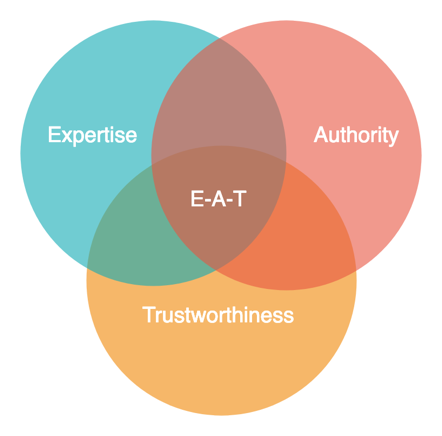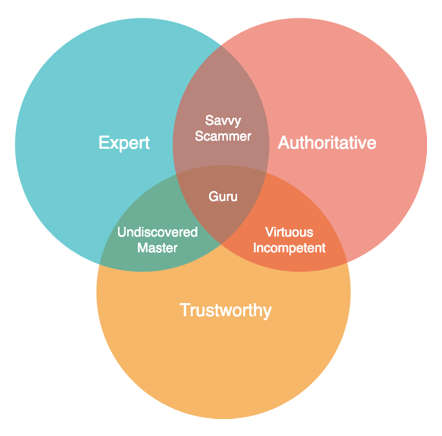When it comes to Google search results, it turns out nice guys finish first.
In one of Google’s latest algorithm shakeups, the company announced that the more reliable a website’s content is, the higher that website will rank. This means that the websites that prove themselves as reliable will receive a surge of organic traffic.
Google’s system of determining reliability, which is known in the SEO community as E-A-T, measures sites’ Expertise, Authority, and Trustworthiness.

Future-forward eCommerce websites will develop strategies to obtain E-A-T and develop relationships with organizations, people and websites who have E-A-T (mostly through link building and online mentions).
Google employs Search Quality Evaluators, whose job it is to train Google’s software to find and penalize websites that promote spammy content, spread misinformation, or “misrepresent or conceal their ownership or primary purpose”.
Google gives ranking boosts to trustworthy websites, while knocking down websites that do not have E-A-T factors.
The following excerpt from “How Google Fights Disinformation” explains how Google’s Search Quality Evaluators measure the quality of a given website.
Evaluators assess whether a website provides users who click on it with the content they were looking for, and they evaluate the quality of results based on the expertise, authoritativeness, and trustworthiness of the content.
The fact that Google confirmed this is significant, as it conclusively tells us that improving a website’s E-A-T is vital for moving to the top of the search engine results.
What Does E-A-T Really Mean?
To understand the specific actions we can take to leverage expertise, authority, and trustworthiness, we should first establish what each of them mean to Google.
Expertise
Expertise means a website or author has the knowledge to publish accurate information.
Example of someone who is an expert, but not authoritative or trustworthy:
Picture someone who has spent their lives reading scientific textbooks, being taught by some of the preeminent scientists in the world, and earning degrees from prestigious institutions. However, this person has never once written a paper or conducted a study—and, as it so happens, is also a pathological liar.
While they have the knowledge to speak confidently about a variety of subjects, the scientific community would be unlikely to listen, since they have no standing in the community. And due to their tendency to lie, whatever they say would be taken with a grain of salt anyway.
Authority
Authority is more about standing within a community or field than it is actual knowledge or accuracy.
Example of someone who is authoritative, but not an expert or trustworthy:
An authoritative scientist might have a lot of name recognition and keynote every conference they speak at, yet they did not actually graduate from that prestigious university they say they did, and are, in fact, secretly funded by the oil lobby. Despite being a notorious figure, they are not an expert, and what they say shouldn’t necessarily be trusted due to their undisclosed ties to Big Oil.
Trustworthiness
Google measures trust by determining the risk associated with interacting with a given website or person.
You can think of this as the intent behind the content/website—or how risky it would be to visit a website or do business with it.
Example of someone who is trustworthy, but not authoritative or an expert:
A trustworthy scientist might be employed by a little-known environmental non-profit. They are dedicated to uncovering the truth, and have nothing but noble intentions fueling their work. However, they’re only a few months out of school, and therefore don’t have the same well of experience to draw from as their more senior colleagues. Their lack of experience and name recognition means that while their work is 100% authentic and factual, it won’t be paid the same creedence as someone who is a well-established name at a major institution.
E-A-T Traps—And How To Avoid Them

Being proficient in just one of these factors, or even two, is not enough. Since people are risking their financial well-being when making a purchase online, Google expects E-commerce websites to have all three E-A-T factors (the guru in our diagram above) and to associate with organizations that have E-A-T. Lacking in one area could result in Google seeing your site as a “savvy scammer”, “undiscovered master” or “virtuous incompetent”.
As Google’s algorithms become more refined, its ability to detect insufficient E-A-T will only improve. Future-minded websites will take note of this and strategize accordingly.
How Do You Improve E-A-T?
The short answer: hard work. There are no shortcuts—by design.
Google puts immense emphasis on a website’s expertise, authority, and trustworthiness because these things are hard to fake.
To capitalize on and grow your website’s E-A-T, you must consider how you can prove your value to your audience. More specifically, you must ask yourself: What would make a user put enough faith in your website to confidently do business with it?
Things like accurate information, properly cited sources, author credentials, company certifications, positive reviews/write-ups, links from other sites with E-A-T, and institutional affiliations will persuade them of your value, while things like overt sales pitches, manipulative/disingenuous rhetoric, and shady motives will raise red flags.
The following strategies are designed to grow all three E-A-T factors.
Growing Expertise
- Employ writers with impressive resumes.
- Reach out to experts in the field for guest articles/posts.
- Encourage your staff to take classes, attend conferences, earn accreditations, etc.
Growing Authority
- Host events.
- Produce and share video content.
- Speak at industry conferences.
- Contribute to a major publication/journal.
- Write or contribute to a book.
- Submit articles for publication.
- Write a one-off/recurring column in a newspaper.
- Implement a comprehensive link-building strategy.
Growing Trustworthiness
- Be good to your customers.
- Be deserving of positive reviews.
- Encourage your best customers to write reviews.
- Make sure all facts are properly cited.
- Keep sales pitches separate from informational content.
- Vet contributors for conflict-of-interest or shady affiliations.
- Update any content you realize is out-of-date, incorrect, or misleading.
Building an E-commerce site that Google trusts will lead to tremendous SEO success. Getting to that point is all about being sympathetic with your target demographic, relieving customers’ concerns, and proving your credibility. If done well, this will mean increased rankings, traffic, and—most importantly—sales!

